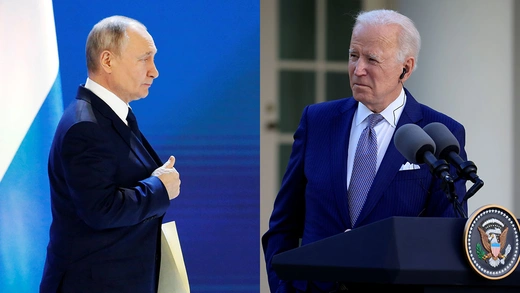What to Watch for at the Biden-Putin Summit
U.S.-Russia bilateral relations have fallen to a new low, with Ukraine, Belarus, cyberattacks, and nuclear weapons among the biggest disagreements. What’s the best way to judge this summit’s success?
By experts and staff
- Published
Experts
![]() By Stephen SestanovichGeorge F. Kennan Senior Fellow for Russian and Eurasian Studies
By Stephen SestanovichGeorge F. Kennan Senior Fellow for Russian and Eurasian Studies
U.S. President Joe Biden’s meeting with Russian leader Vladimir Putin in Geneva next week will stimulate near-endless speculation and analysis. Who, many will ask, “won” the summit? To answer this question, pundits, publics, and policymakers are likely to rely on four yardsticks: how the encounter compares to President Donald Trump’s meetings with Putin; whether the Biden administration embraces another “reset;” the size and scope of any agreements reached; and how much the week’s other summits produce.
The Trump Benchmark
Biden can go a long way toward a successful summit merely by avoiding Trump’s mistakes. The former U.S. president never understood that by not challenging Putin on election meddling and other issues, he made bipartisan pushback from Congress (and new sanctions against Russia) unavoidable. Biden, by contrast, seems to be eager to put forth Western complaints, even as he tries to put relations on a better track. (From the standpoint of tough-guy credibility, it is surely a plus that Biden has already called Putin a “killer.”) Biden’s advisors know that, after the meeting, they will have to describe sharp back-and-forth over Russia’s continuing occupation of eastern Ukraine, the Kremlin’s ongoing crackdown on political opponents, and its support for even harsher policies in Belarus.
Another Reset?
The president’s foreign policy team often observes that Biden wants a U.S.-Russia relationship different not only from Trump’s, but also from President Barack Obama’s. However unfairly, the reset of the early Obama administration is now routinely treated as a synonym for wishful thinking about Russia. White House officials insist they have no illusion that it will be easy to get Moscow to change course. They envision a process carried out at working levels, with diplomatic experts carefully—and skeptically—exploring areas of possible common ground, from Iran’s nuclear program to climate change. Seen this way, a successful summit outcome—and one most clearly not a reset—has to include an agreement to keep talking, but not much else.
Small-Scale Deals

Even a minimalist Biden-Putin meeting will generate what bureaucrats call “deliverables:” a short list of items on which the two leaders put aside past disagreements and turn the page. Likely candidates for this summit include the return to post of each country’s ambassador (both have been home for “consultations”); some easing of restrictions on embassies and consulates in the two countries; the release of one or more Americans now held in Russian prisons; and a loose framework for resuming discussion of nuclear arms control. Vague hints of progress on other issues are also possible. Biden’s team seems especially eager for the Kremlin to agree to take up the problem of cybercriminals operating with seeming impunity in Russia.
The Rest of Biden’s Trip
Although press coverage of Biden’s first foreign travel is focusing on the Putin meeting, the administration’s narrative for the trip as a whole is different. Several other summits are in store: first with UK Prime Minister Boris Johnson, then the gatherings of the Group of Seven (G7) and North Atlantic Treaty Organization (NATO), plus separate sessions with senior EU leaders in Brussels. Because such events often involve more ceremony than substance, the White House wants to show that it can achieve meaningful results. The G7 finance ministers’ new global tax agreement and the pre-summit visit by NATO Secretary-General Jens Stoltenberg to Washington, DC, were designed to bolster this claim. If Biden can further strengthen the story line of Western unity, particularly on hard issues such as the Nord Stream 2 pipeline, NATO defense spending, and Ukraine and Belarus, he will sit down with Putin on still more advantageous terms.
These four indicators will define much public discussion of the Geneva meeting. Additionally, Biden and his team will make a private assessment of how interested Putin is in remaking Russia’s relations with the West. Is he prepared to adjust Russian policy, whether at home or abroad, in ways that would begin to lessen his international isolation? Or does he find the image of Russia under siege too hard to shed, too tied to a grand idea of his historic role, and too useful in domestic politics? U.S. officials will get no final answer to these questions, but their developing assessment of Putin’s outlook will affect the time, energy, and commitment they invest in relations with Russia after the summit.
